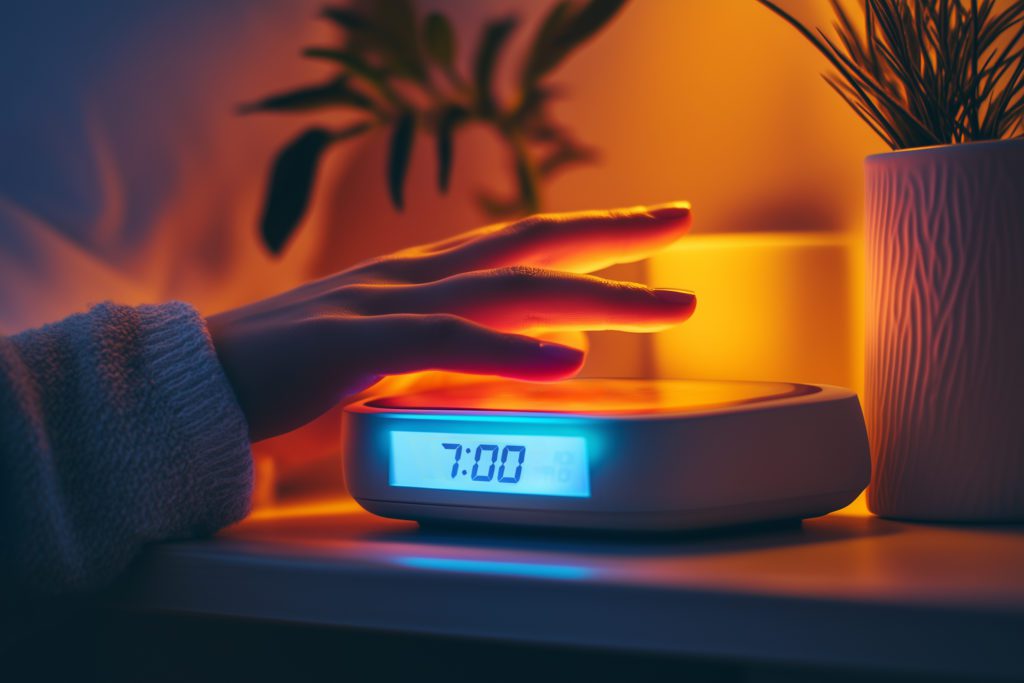
Understanding Your Chronotype: How It Impacts Your Sleep and Productivity
Your chronotype refers to your body’s preferred sleep, wake, and productivity times. Understanding your chronotype can greatly influence your sleep and productivity.

Have you ever classified yourself as an early bird or night owl? These distinctions aren’t just a saying; some people have circadian rhythms that favor the morning, while others favor the night.
Also known as chronotypes, these designations of when your body feels sleepy and productive can be helpful to know in order to promote both; once you know your chronotype, you can better arrange your day.
What is a Chronotype?
A chronotype is your body’s natural preferences for sleep times. However, in addition to regulating your sleep/wake times, your chronotype can also influence your appetite, exercise, and body temperature. It also influences the time of day you feel tired or productive.
Essentially, your chronotype refers to the timing of your circadian rhythm and, as a result, everything that it influences. Some researchers theorize that variations in chronotype were once a crucial survival technique in hunter-gatherer times as it allowed for people to take turns sleeping by varying when sleepiness set in. This way, someone could always keep watch during the night.
Nowadays, chronotypes no longer serve this purpose, but they can still influence your ideal schedule.
What Are the Types of Chronotypes?
Psychologists often utilize the Morningness-Eveningness Questionnaire to categorize people into one of three chronotypes: morning larks, night owls, and hummingbirds. The features of each type include:
The Morning Larks
The morning lark chronotype is synonymous with the early bird. Those who fall into this category wake up early and see the greatest productivity in the morning. As the day progresses, they lose their focus and struggle to follow a social schedule in the evenings.
Wake Up: 5 – 6 A.M.
Greatest Productivity: 9 A.M. – 12 P.M.
Bedtime: 9 – 10 P.M.
The Night Owls
Night owls thrive at night and see greater productivity later in the day. They’re also believed to be more extroverted than their morning lark counterparts.
Wake Up: 10 A.M.
Greatest Productivity: 2 P.M. – 6 P.M.
Bedtime: 3 A.M.
The Hummingbirds
Those who are hummingbirds can flit between being morning lark-skewed or night owl-skewed, making it the most flexible chronotype and, as a result, the most common. Their schedules don’t follow the extremes of the lark and owl, either, instead falling somewhere in-between.
Wake Up: 6:30 – 9 A.M.
Greatest Productivity: 10 A.M. – 2 P.M.
Bedtime: 10 P.M. – 12 A.M.
How Can I Find My Chronotype?
When it comes to determining your chronotype, it helps to think about the times that you prefer to go to bed and wake up, when you eat during the day, your energy levels, and when you feel most productive at work. Once you take note of this information, you can match it to one of the three chronotypes listed above.
You can also look to your family to help determine your chronotype. Evidence suggests that chronotype has a strong genetic background, meaning if your parents are morning larks, you’re more likely to be as well.
The Importance of Learning Your Chronotype
Knowing what chronotype you fit into can help you to improve your sleep quality and quality of life. For instance, if you try to go to bed earlier than your body naturally desires, you may find yourself tossing and turning for hours, missing out on time spent asleep. This can then make you sleepier and less productive during the day.
It’s very difficult to change your chronotype. They tend to shift during life—for example, children are often early risers while teenagers shift to later chronotypes—but they aren’t something that you can out-train. In essence, if your body naturally sleeps later, trying to wake up early will never feel natural. Knowing this, being aware of your chronotype is crucial to finding your ideal schedule.
If your schedule continually conflicts with your chronotype (i.e., having to stay out late when your body prefers to go to bed early), something called social jetlag can occur, which not only makes you tired but can also place those who are otherwise healthy at risk of developing depression and diabetes.
Furthermore, if there are disparities between your schedule and chronotype, the ensuing sleepiness during the day can make tasks requiring concentration or creativity difficult.
The Influence of Chronotype
Your chronotype may influence the areas where you excel. For instance, some studies have found that morning people tend to perform better in school, which is likely because schools have early start times, and the hours that you’re in school align with peak productivity times for those with early chronotypes.
In comparison, it’s been shown that those with later chronotypes may be more creative, but this may be because their creativity is higher in the late afternoon when they may be more likely to work on creative projects.
What To Do If Your Schedule Doesn’t Match Your Chronotype?
While, in a perfect world, we would all be able to pick our schedules based on our body’s chronotype, that is rarely the case. Maybe you’re a teenager with early school start times, an adult with young kids who wake up early, or in a profession that requires late-night socializing. Whatever the hindrance, you’re often going to experience instances where you cannot adhere to your chronotype’s preferred schedule.
The good news is that, even if you’re not following your exact chronotype, you can still take precautions to prompt better sleep, such as:
- Take melatonin supplements. Since chronotype weighs into your circadian rhythm, if you have a later chronotype, your body may not start producing melatonin until later, even if you need to go to sleep early to ensure you get enough shut-eye. To help, consider taking melatonin supplements to support the melatonin levels in your body.
- Try light therapy. If you have to wake up early, try to get some light first thing. Sunlight is best, but any type of bright light can help you feel more alert.
- Refine your sleep hygiene. To make falling asleep easier, ensure your sleep hygiene is cared for by having a sleep-promoting environment and avoiding stimulants.
There are other steps to better match your chronotype, as well. For example, if you prefer to sleep in a little later, try to complete some of your morning tasks at night so that you can get a bit more sleep and more closely align with your chronotype.
Additionally, keep in mind when you’re most productive and try to schedule your most complex tasks during those hours. This way, you don’t have to worry about making mistakes when you’re trying to focus more than your mind is capable of in non-peak hours.
Ultimately, doing what you can to align with your circadian rhythm can go a long way toward making your days more productive and your nights more restful.
FAQ
How does my chronotype affect my eating habits?
Chronotypes influence hunger and meal timing. Morning types often prefer breakfast and eat earlier meals, while night owls tend to skip breakfast and consume larger meals later, which can impact digestion and metabolism.
Are certain chronotypes more prone to health issues?
Night owls face higher risks of metabolic disorders, obesity, heart disease, and depression, often due to irregular sleep, late eating, and social misalignment. Morning types generally have better overall health, likely due to more stable routines and better alignment with work schedules and natural light exposure.
Can my chronotype affect my risk of insomnia?
Yes, night owls are more likely to experience insomnia due to social misalignment, late-night screen exposure, and irregular sleep schedules. Their difficulty waking early for work or school can lead to chronic sleep deprivation, worsening insomnia symptoms. Maintaining a consistent sleep routine can help.
How do chronotypes impact relationships?
Different chronotypes can create challenges for couples or roommates, as mismatched sleep-wake schedules affect social time, intimacy, and shared activities. Partners may struggle with bedtime routines, morning interactions, or energy mismatches, requiring compromise and adjustments for balance.
What careers are best suited for different chronotypes?
Morning types excel in traditional 9-to-5 jobs, where early productivity is valued. Night owls may struggle in these settings but thrive in flexible careers like freelancing, creative fields, or night-shift work. Choosing a job aligned with your natural rhythms can enhance efficiency, focus, and job satisfaction.
How do chronotypes relate to shift work and job performance?
Evening types often adapt better to night shifts, while morning types may struggle with late work hours. However, long-term shift work misaligned with one's chronotype can cause fatigue, reduced focus, and increased health risks. Employers recognizing chronotypes may improve productivity and well-being.
Can my chronotype affect my exercise performance?
Yes, morning chronotypes may perform better in early workouts due to peak energy levels, while night owls often find evening exercise more effective. Aligning workouts with your natural rhythm can improve motivation, endurance, and performance, preventing fatigue and enhancing overall fitness results.
Can my chronotype affect my exercise performance?
Social jetlag occurs when your biological clock is misaligned with societal demands, such as work or school schedules. This can lead to chronic sleep deprivation, fatigue, mood swings, metabolic issues, and an increased risk of long-term health problems like obesity, diabetes, and cardiovascular diseases.

Written by
Jessica G
Medical writer freelancer who has written hundreds of articles on varying topics. Masters of Engineering degree in Biomedical Engineering.
Download Pillow
Get help
Press & News
Legal
Connect
X (Twitter)
Company
Copyright © Neybox Digital Ltd.



